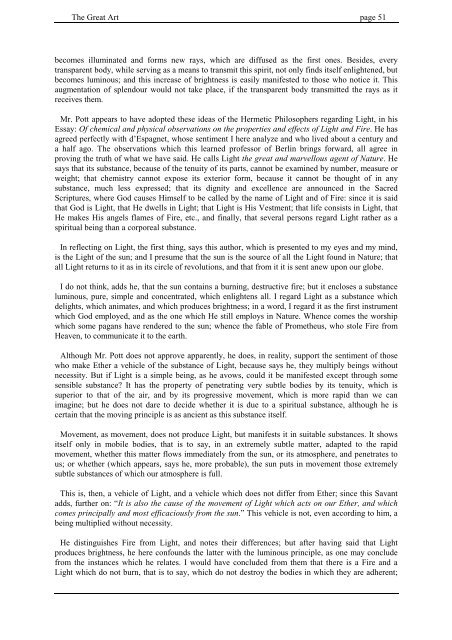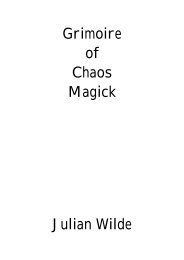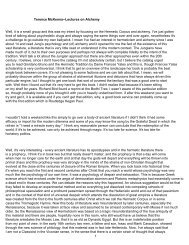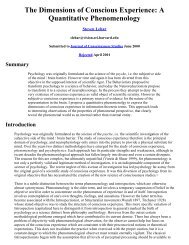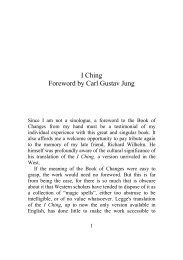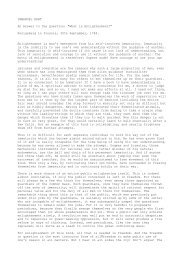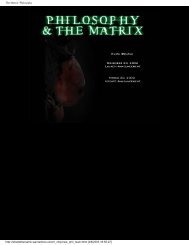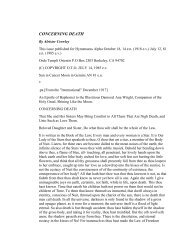Pernety - A Treatise On The Great Art.pdf - cyjack.com
Pernety - A Treatise On The Great Art.pdf - cyjack.com
Pernety - A Treatise On The Great Art.pdf - cyjack.com
Create successful ePaper yourself
Turn your PDF publications into a flip-book with our unique Google optimized e-Paper software.
<strong>The</strong> <strong>Great</strong> <strong>Art</strong> page 51be<strong>com</strong>es illuminated and forms new rays, which are diffused as the first ones. Besides, everytransparent body, while serving as a means to transmit this spirit, not only finds itself enlightened, butbe<strong>com</strong>es luminous; and this increase of brightness is easily manifested to those who notice it. Thisaugmentation of splendour would not take place, if the transparent body transmitted the rays as itreceives them.Mr. Pott appears to have adopted these ideas of the Hermetic Philosophers regarding Light, in hisEssay: Of chemical and physical observations on the properties and effects of Light and Fire. He hasagreed perfectly with d’Espagnet, whose sentiment I here analyze and who lived about a century anda half ago. <strong>The</strong> observations which this learned professor of Berlin brings forward, all agree inproving the truth of what we have said. He calls Light the great and marvellous agent of Nature. Hesays that its substance, because of the tenuity of its parts, cannot be examined by number, measure orweight; that chemistry cannot expose its exterior form, because it cannot be thought of in anysubstance, much less expressed; that its dignity and excellence are announced in the SacredScriptures, where God causes Himself to be called by the name of Light and of Fire: since it is saidthat God is Light, that He dwells in Light; that Light is His Vestment; that life consists in Light, thatHe makes His angels flames of Fire, etc., and finally, that several persons regard Light rather as aspiritual being than a corporeal substance.In reflecting on Light, the first thing, says this author, which is presented to my eyes and my mind,is the Light of the sun; and I presume that the sun is the source of all the Light found in Nature; thatall Light returns to it as in its circle of revolutions, and that from it it is sent anew upon our globe.I do not think, adds he, that the sun contains a burning, destructive fire; but it encloses a substanceluminous, pure, simple and concentrated, which enlightens all. I regard Light as a substance whichdelights, which animates, and which produces brightness; in a word, I regard it as the first instrumentwhich God employed, and as the one which He still employs in Nature. Whence <strong>com</strong>es the worshipwhich some pagans have rendered to the sun; whence the fable of Prometheus, who stole Fire fromHeaven, to <strong>com</strong>municate it to the earth.Although Mr. Pott does not approve apparently, he does, in reality, support the sentiment of thosewho make Ether a vehicle of the substance of Light, because says he, they multiply beings withoutnecessity. But if Light is a simple being, as he avows, could it be manifested except through somesensible substance? It has the property of penetrating very subtle bodies by its tenuity, which issuperior to that of the air, and by its progressive movement, which is more rapid than we canimagine; but he does not dare to decide whether it is due to a spiritual substance, although he iscertain that the moving principle is as ancient as this substance itself.Movement, as movement, does not produce Light, but manifests it in suitable substances. It showsitself only in mobile bodies, that is to say, in an extremely subtle matter, adapted to the rapidmovement, whether this matter flows immediately from the sun, or its atmosphere, and penetrates tous; or whether (which appears, says he, more probable), the sun puts in movement those extremelysubtle substances of which our atmosphere is full.This is, then, a vehicle of Light, and a vehicle which does not differ from Ether; since this Savantadds, further on: “It is also the cause of the movement of Light which acts on our Ether, and which<strong>com</strong>es principally and most efficaciously from the sun.” This vehicle is not, even according to him, abeing multiplied without necessity.He distinguishes Fire from Light, and notes their differences; but after having said that Lightproduces brightness, he here confounds the latter with the luminous principle, as one may concludefrom the instances which he relates. I would have concluded from them that there is a Fire and aLight which do not burn, that is to say, which do not destroy the bodies in which they are adherent;


